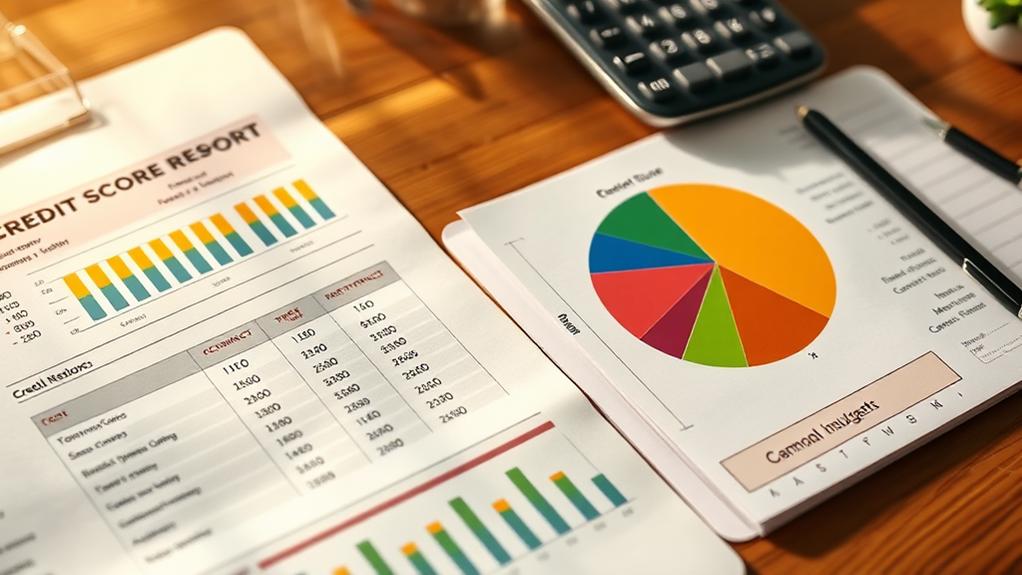Mastering Credit Scores for Effective Budgeting
Mastering your credit score is essential for effective budgeting. It influences your ability to secure loans, get lower interest rates, and even impacts rental opportunities. Start by checking your credit report regularly to spot any errors. Make sure to pay bills on time and keep your credit utilization ratio below 30%. By understanding how your financial habits affect your credit score, you can prioritize certain payments and limit unnecessary credit inquiries. This proactive approach not only strengthens your score but also enhances your overall financial health. There’s a lot more you can explore to further optimize your strategy.
Key Takeaways
- Regularly monitor your credit score to understand its impact on your budgeting decisions and overall financial health.
- Prioritize on-time bill payments to enhance your credit score and demonstrate financial responsibility.
- Keep your credit utilization ratio below 30% to maintain a healthy score while managing your budget effectively.
- Build an emergency fund to avoid relying on credit during unforeseen expenses, protecting your credit score.
- Integrate credit score awareness into your budgeting practices to make informed financial decisions and achieve your goals.
What Is a Credit Score?
Understanding what a credit score is can greatly impact your financial health. A credit score is a numerical representation of your creditworthiness, typically ranging from 300 to 850. Lenders, landlords, and even some employers use this score to gauge how responsibly you manage borrowed money. The higher your score, the more likely you are to secure loans, credit cards, or housing at favorable terms.
Think of it as your financial reputation. When you’re liberated from the constraints of poor credit, you open doors to opportunities that can elevate your life. A good credit score can lead to lower interest rates, which means you’ll pay less over time for anything from a mortgage to a car loan. It’s about empowerment—having the ability to make informed decisions that align with your financial goals.
Factors Affecting Credit Scores
Your credit score doesn’t just appear out of thin air; it’s influenced by several key factors that shape your financial profile. The most significant factor is your payment history. If you pay your bills on time, you demonstrate reliability, which boosts your score. Late payments, on the other hand, can drag it down, making it essential to stay organized.
Another critical element is your credit utilization ratio—the amount of credit you’re using compared to your total available credit. Ideally, you should keep this ratio below 30%. The length of your credit history also matters; longer histories show lenders that you’ve managed credit responsibly over time.
New credit inquiries can impact your score as well. Each time you apply for credit, a hard inquiry occurs, which can lower your score temporarily. Finally, the mix of credit types—credit cards, loans, and mortgages—can play a role. A diverse portfolio shows you can handle various forms of credit.
Understanding these factors puts you in control of your financial destiny. By actively managing them, you liberate yourself from the constraints of poor credit, paving the way to better financial opportunities.
Importance of Credit Scores

Recognizing the importance of credit scores can greatly impact your financial future. Your credit score isn’t just a number; it’s a key that reveals various financial opportunities. A good credit score can provide you with the freedom to make choices that align with your goals. Here’s why understanding your credit score is essential:
- Access to Credit: A strong credit score makes it easier to secure loans, credit cards, and mortgages when you need them.
- Lower Interest Rates: With a higher score, you’re more likely to receive favorable interest rates, saving you money over time.
- Better Rental Opportunities: Landlords often check credit scores. A solid score can help you land that dream apartment without hassle.
- Employment Prospects: Some employers consider credit scores during hiring processes, especially for financial positions.
Strategies to Improve Credit Scores
Improving credit scores isn’t just a challenging task for some; it’s a journey that can lead to significant financial benefits. To start, check your credit report regularly. Identify any errors and dispute them immediately; correcting inaccuracies can give your score a quick boost. Next, pay your bills on time. Consistent, timely payments show lenders you’re reliable, which can enhance your creditworthiness.
Another effective strategy is to reduce your credit utilization ratio. Aim to use less than 30% of your available credit. If you’re close to that limit, consider paying down existing balances or requesting a credit limit increase. This gives your score a better standing.
Additionally, don’t open new accounts unnecessarily. Each hard inquiry can temporarily lower your score. Instead, focus on maintaining the accounts you already have. Finally, consider becoming an authorized user on a responsible person’s credit card. This can benefit you without requiring you to manage the account.
Embrace these strategies with determination. Each step you take toward improving your credit score can lead to greater financial liberation and opportunities, freeing you from the constraints of poor credit.
Budgeting With Your Credit Score

Budgeting effectively while keeping your credit score in mind can pave the way for sound financial health. When you align your budgeting practices with your credit score, you not only empower yourself financially but also create a foundation for greater freedom. Here are some key points to reflect on:
- Know Your Credit Score: Regularly check your score to understand how your budgeting habits impact it.
- Prioritize Payments: Allocate funds to pay bills on time, as late payments can greatly hurt your score.
- Limit Credit Utilization: Keep your credit card balances below 30% of your limit, which helps maintain a healthy score.
- Build an Emergency Fund: This buffer can prevent you from relying on credit in times of need, keeping your score intact.
Frequently Asked Questions
How Often Should I Check My Credit Score?
You should check your credit score as often as you check your social media—daily if it makes you feel alive! Seriously, aim for at least once a year to stay informed and empowered.
Can I Have Multiple Credit Scores?
Yes, you can have multiple credit scores. Different credit bureaus calculate scores using varying formulas. By checking multiple scores, you get a clearer picture of your credit health, empowering you to make informed financial decisions.
Do Closed Accounts Affect My Credit Score?
Closed accounts can affect your credit score, but it depends on the account’s history. If you paid on time, it might help. However, too many closed accounts can negatively impact your overall score. Stay aware!
How Long Do Negative Marks Stay on My Report?
Negative marks generally stick around for seven years on your credit report. However, you can take steps to improve your score in the meantime, so don’t let them hold you back from financial freedom.
Is It Safe to Use Credit Monitoring Services?
Think of credit monitoring services as your financial guardian angel. They’re generally safe, helping you spot fraud and errors quickly. Just guarantee you choose a reputable provider, and you’ll set yourself free from unnecessary stress.




